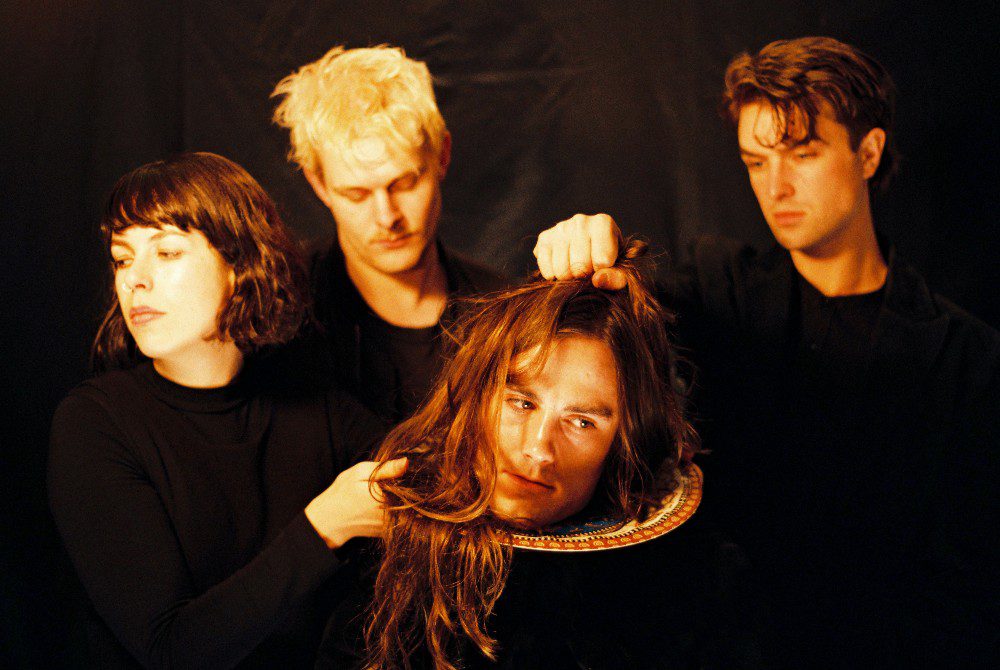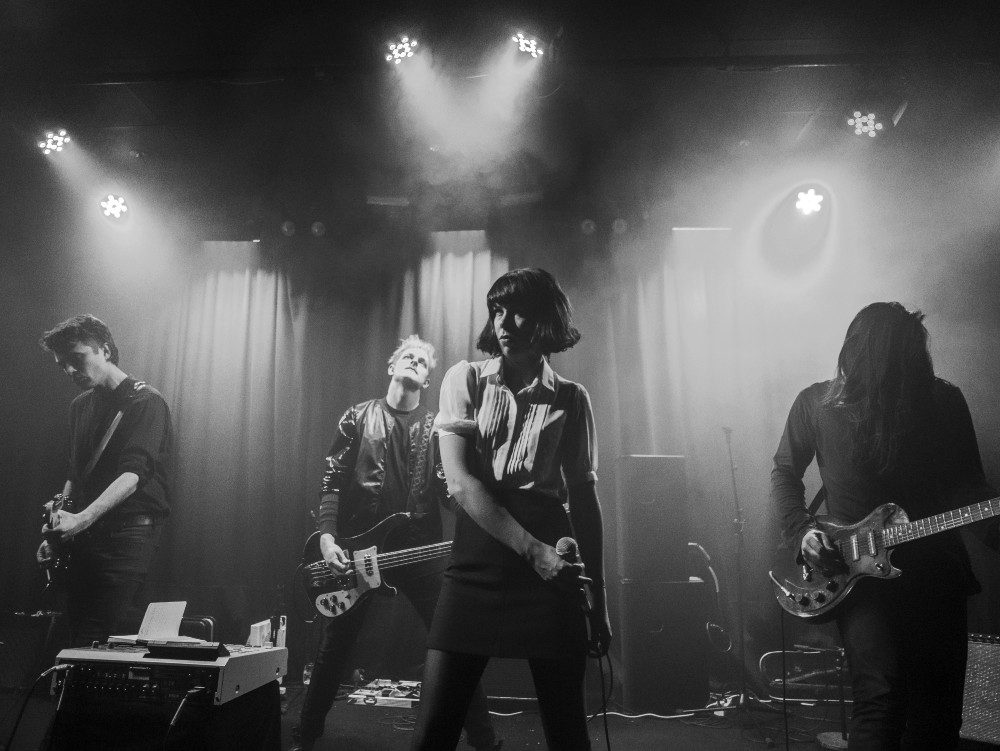

Dark, viscous, harsh and dramatic: fair to say that Bitumen lives up to their moniker with a sonic offering that weaves elements of metal, post-punk, synths and layered harmonies. On sophomore album Cleareye Shining, the four-piece sounds like the lovechild of My Bloody Valentine and My Life With The Thrill Kill Kult. It skins your knees one moment and soothes the rawness with dreamy, nuanced melody the next. This month, the album finally sees release on vinyl and CD, having been available digitally since November 2021 via Heavy Machinery Records.
Melbourne is laying claim to them, but Bitumen – Kate Binning, Bryce, Simon Maisch and Sam Varney – originated in Tasmania’s capital city of Hobart. Binning and Varney have been partners for eight years, while Varney and Maher had been best friends for even longer. And Maisch? “We knew Simon peripherally, but he was in this punk band [Bears] – he was this intimidating guy with bleached blonde hair and a cool tattoo,” Binning recalls. “We moved to Melbourne in dribs and drabs over six years ago. We were all in bands in Hobart that ended when we moved so we were all, individually, looking to start something. Simon was really the catalyst because me, Sam and Bryce were all living together and Simon invited us over to his shed in Preston [in Melbourne’s inner north] for a practice, and it came together super well.”
Bitumen, having established a solid camaraderie as musicians, and with the bonus of Maisch’s production and engineering skills, made waves with their 2018 debut Discipline Reaction, recorded at Magnet Studios in four days.
That debut showcased the metallic echo of distorted, furied post-punk guitar on “Twice Shy,” which rubbed up against the clanging percussion, mewling guitar and ghostly vocals on “At Bended Knee.” The vampiric, wild spirit of Bauhaus lurks in the wings, along with a sprinkling of the pop-driven catchiness of The Cure and the midnight splendour of Dead Can Dance.
Cleareye Shining was financially and artistically supported by City of Melbourne and the Victorian State Government’s Flash Forward program. It sounds like an organic evolution, a consolidation of their sonic identity, rather than a left-turn from Discipline Reaction. “We wanted to keep, even expand on, the drama, really, [and] the cinematic nature of the songs, make them even more dynamic,” proffers Binning. “I think of the songs as little movies that have act one, act two, act three and they really go somewhere.”
Whereas their debut album was recorded with the intention of capturing their live energy, Cleareye Shining was very much an investigation of what they could create with layers, synths, production and with the financial and creative freedom given by the grant. When the pandemic struck in February 2020, the band had most of the songs for Cleareye Shining in draft stage. Their intention to create an album that captured the fizzing, unvarnished effect of their live performances transitioned into the sharper, more polished studio album of nine tracks.
“We just leaned into doing a studio record and we weren’t as concerned about capturing the energy of playing live. [Instead] we went about crafting something really meticulous,” Binning says. “We’d been listening to ‘80s big production – Peter Gabriel, Kate Bush – where the production is its own element as much as the instruments and the words; the way something is recorded and put together is an artistic choice.”
Theirs was a decision made in the dire circumstances of lockdowns, but rather than lessening the impact of their lusciously layered, immersive, and savage metal-dance dramatics, the careful production emphasizes the almost mathematically precise measures of bass, synths, piano, menacing guitar and honeyed vocals. If you put a bunch of ‘80s goth anthems, ‘90s Nu Metal bands and a bunch of lusty machines through a meat grinder, it might sound a lot like Cleareye Shining.
“The beat or the percussion is evolving all the time as the songs are evolving. It’s constant. We’ll be making a demo, thinking about it for the next week, then going back to practice and adding or changing,” says Binning. “On this album, we started using synths because we let go of the idea that it was something we’d perform live. So we leaned into layering it up and having people making a few different instruments on the same song. My lyrics and vocal melodies would usually come in at the last second.”
Binning had a notebook of words, ideas, and phrases that she translated into lyrics once she could decipher the mood, energy, and visuals associated with the instrumentals and melodies. That cinematic quality was the overriding essence of the album. She’s already envisioned the film it would soundtrack.
“We said it would be like an erotic thriller meets a dystopian action movie,” she reveals. “I love Paul Verhoeven movies, I think he’s a genius. I said it was like Basic Instinct meets Robocop. A lot of the songs are futuristic dystopian, or utopian, leaning. It’s intrigue, it’s romance, and it’s drama.”

The band, a tight unit that thrives on collaboration, experimenting, live drum sequencing, looping and sampling, were determined to only create when they could be in the one space together. Trading files and Zoom meetings were not on their agenda. So when restrictions allowed, they recorded the majority of the album at their Brunswick studio, then did a final block of six days at The Aviary to achieve the final overdubs, vocals and re-amps.
Bringing in accomplished Melbourne engineer, producer, and guitarist (in metal band High Tension) Mike Deslandes on mixing duties was “invaluable,” says Binning. “When we handed it off to him, there were 80 different tracks in the sessions, so he had to go through all of them and mix it all together, which I do not envy.”
“Because we’re so insular and work on our own all the time,” she continues, “it was the first time someone had listened to the whole thing with fresh ears. So it was interesting hearing his take on certain songs. He’d say, ‘This is a pop song,’ and we hadn’t thought of it like that… Mike is genuinely almost like a savant! Watching him use the computer… it’s all a mystery to me. He’s able to wrangle sense out of a fairly nonsensical arrangement, sometimes.”
Billing readily nominates “Spun Gold Heaving” as a favourite from the album.
“That is just so fun to play live. The germ of the idea for that came from listening to – I hate name dropping Nick Cave because it’s so cliched! – but listening to [1996 album] Murder Ballads, and even that whole genre that goes back to the whole blues tradition of murder ballads,” explains Binning. “What does that mean, not to write a song that’s personal or confessional, but as a character who’s awful and a murderer? The guitar parts the boys came up with were really intense and made me feel really powerful so that was a great song for me to make my murder ballad. It’s tongue-in-cheek and also so raucous and heavy.”
The last song on the album, “Luxury Auto” slithers in like a ravenous viper seeking prey. Binning’s ghostly, femme fatale vocal bristles with malevolent, vampiric intent. The guitars shiver with kinetic energy, letting go into frenzied metallic whips. It’s elegant, sexy, and full of glamorous, gothic drama.
“That’s the last one we wrote in the chronology,” she says. “We had all the other songs ready. It came from quite an organic jam. The boys named it ‘Luxury Auto’ when it was still an instrumental because it felt mysterious, thinking about espionage, spy movies and that European feel. Then I found it to be really emotive and was thinking about the espionage theme. In life we all have our missions, and our allies, our enemies. It can feel very mysterious not knowing other people’s intentions and who’s out to get you. The vibe of the song emerged from the music and I just naturally went from there. We haven’t worked out how to play that one live yet, but that’s one of my favourites as well.”
As long as they’re crafting melodic, utopian, immersive synth-guitar soundscapes worthy of an Alex Proyas, Luc Besson or Paul Verhoeven movie, Melbourne is going to lay claim to Bitumen. Just don’t tell Hobart.
Follow Bitumen on Instagram and Facebook for ongoing updates.

